Alternatives to Animal-based Milk
Food list
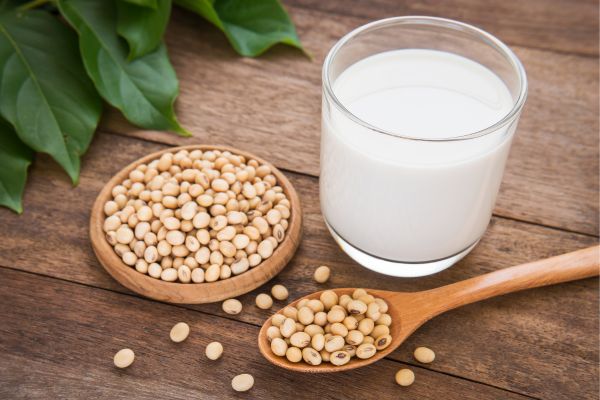
Other names (local names):
Soya Milk
Origin:
Soy Milk a plant-based drink produced by soaking and grinding soybeans, boiling the mixture and filtering out the particulates. It is a stable emulsion of oil, water and proteins. It originated from China.
Nutritional value and benefits:
- Soy milk may be used as a substitute for dairy milk for vegans or lactose intolerant individuals.
- It is used for making alternative dairy products such as soy yoghurt, soy cream, soy kefir, and soy-based cheese analogues.
- It is also used as ingredients for making milkshakes, pancakes, smoothies, bread, mayonnaise and baked goods.
Nutrient content | Soy milk (unsweetened) | |
Energy | 330 Kcal | |
Protein | 6.95g | |
Fat | 3.91g | |
Saturated fat | 0.5g | |
Carbohydrate | 4.23g | |
Fiber | 1.2g | |
Calcium | 301mg | |
Potassium | 292mg | |
Vitamin B12 | 2.70iu |
More information:
For more information on how to prepare soya bean milk. Kindly watch:
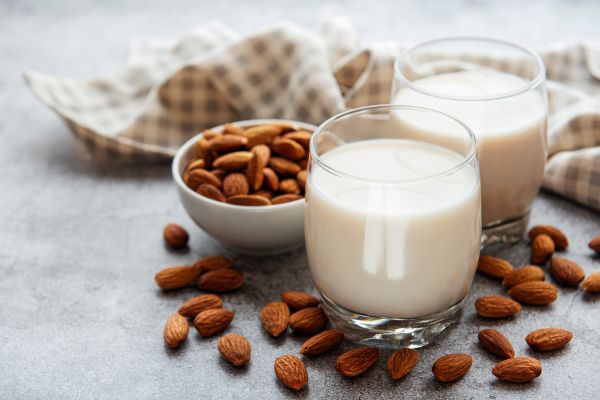
Origin:
Almond milk is a plant-based milk substitute with a watery and nutty flavour produced from almonds. It does not contain cholesterol or lactose and it is low in saturated fat. Almond milk is often consumed by those who are lactose intolerant and vegans who avoid dairy products. It can also be made at home using a blender, almonds and water.
Nutritional value and benefits:
Nutrient content | Almond milk (unsweetened) | |
Energy | 160 Kcal | |
Protein | 1.55g | |
Fat | 2.88g | |
Saturated fat | 0.21g | |
Carbohydrate | 1.52g | |
Fiber | 0g | |
Calcium | 516mg | |
Potassium | 176mg | |
Vitamin B12 | 0iu |
- Almond milk contains low calorie as such do not cause weight gain.
- Almonds are also high in fat and protein, and do not cause a spike in blood sugar levels especially for those with diabetes.
- It contains calcium which is essential for building and maintaining bones. It helps to reduce the risk of osteoporosis.
- Almond milk contains anti-inflammatory and antioxidant properties that help to keep the heart healthy.
More information:
For more information, kindly click on this link:
https://www.youtube.com/watch?v=T3jyLa6Xr6c
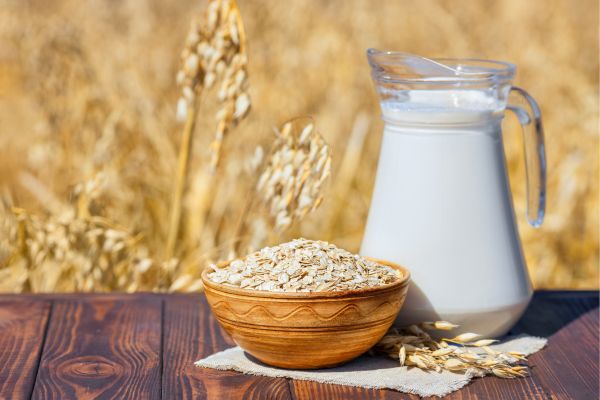
Origin:
Oat milk is plant-based milk derived from whole oat grains by extracting the plant material with water. It has a creamy texture and mild oatmeal-like flavour, and it can be manufactured in various flavours such as sweetened, unsweetened, vanilla, and chocolate. Oat milk is a substitute for dairy products for vegans or lactose-intolerant people.
Nutritional value and benefits:
Nutrient content | Oat milk (unsweetened) | |
Energy | 500 Kcal | |
Protein | 3g | |
Fat | 5g | |
Saturated fat | 0.5g | |
Carbohydrate | 16g | |
Fiber | 2g | |
Calcium | 350mg | |
Potassium | 389mg | |
Vitamin B12 | 1.2iu |
- Oat milk is a good source of a number of nutrients, vitamins, and minerals.
- It contains many proteins, which help build and repair cells and body tissues and produce hormones, antibodies, and enzymes.
- The presence of fibre helps to manage the low-density lipoprotein cholesterol levels in the blood.
- It also contains calcium, which helps build and maintain strong bones, teeth, and other functions.
- Vitamin B12 helps keep the nerves and the blood cells healthy, make DNA, and prevent megaloblastic anaemia.
More information:
For more information on how to make oat milk, kindly click the link below
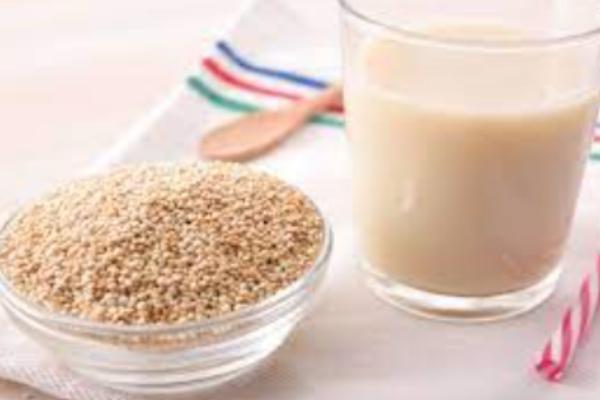
Origin:
Quinoa milk is plant-based milk produced from Quinoa seeds grown as a crop primarily for its edible seeds. The seeds are rich in protein, dietary fibre, B vitamins and dietary minerals in amounts greater than many grains. Quinoa milk is gluten-free and has a high concentration of proteins.
Nutritional value and benefits:
Nutrient content | Cooked Quinoa |
Calories | 222 kcal |
Protein | 8 grams |
Fat | 3.55 grams |
Folate | 19% of daily value |
Carbohydrate | 39 grams |
Fiber | 5 grams |
Magnesium | 28% of daily value |
Potassium | 7% of daily value |
Vitamin B6 | 13% of daily value |
- Quinoa contains antioxidants that help to protect the body cells from damage caused by unstable molecules called free radicals.
- Quinoa fibre content helps to support digestive health and promote regular bowel movements.
- Quinoa fibre-rich juices help to support gut health and body weight maintenance.
- The high protein content of quinoa helps meet the body's daily protein needs for vegans.
- Quinoa contains important vitamins and minerals such as magnesium, iron, potassium and folate, which help in foetal growth and development in pregnant women.
More information:
Check out the following links for more information
https://www.youtube.com/watch?v=mc1F5SM8veA
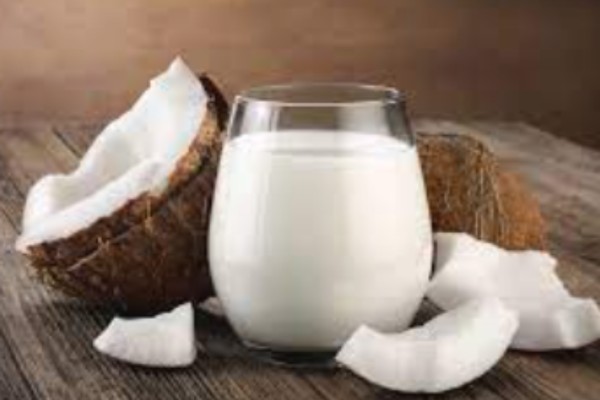
Origin:
Coconut milk is an opaque, milky-white liquid extracted from grated pulp of mature coconuts. Coconut milk has a rich taste and high saturated oil content. It can be used to produce milk substitutes known as coconut milk beverages.
Nutritional value and benefits:
S/N | Nutrient content | Nutritional value per 100g/Daily Value (DV) in 1005 of raw coconut milk |
1. | Energy | 230 Kcal |
2. | Carbohydrate | 5.5 g |
3. | Fat | 23.8g |
4. | Dietary fibre | 2.2 g |
5. | Protein | 2.3g |
6. | Vitamin C | 3% DV |
7. | Vitamin E | 1% DV |
8. | Potassium | 6% DV |
9. | Magnesium | 10% DV |
- Coconut milk helps to reduce body weight and the buildup of fat.
- It helps to increase insulin sensitivity, which may promote weight loss.
- Coconut milk contains lauric acid, an antioxidant that helps to prevent stroke and heart disease.
- It contains antioxidants that help the body fight free radicals and protect the body from diseases.
- The lauric acid has antimicrobial and anti-inflammatory properties, which help to support the immune system.
More information:
For more information on how to produce coconut milk, kindly click on this link:
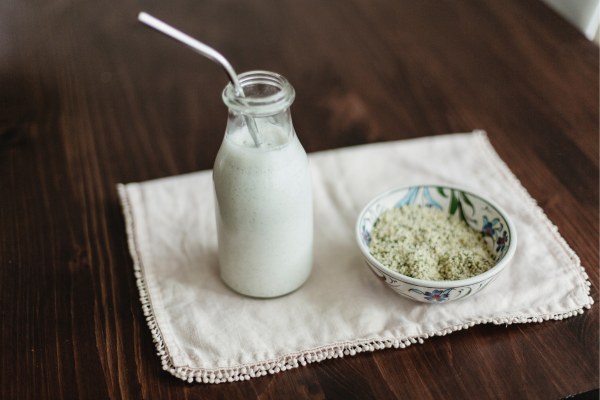
Origin:
Hemp milk is a plant milk made from hemp seeds that are soaked and ground in water. The product resembles milk in colour, texture, and flavour. It is made from whole hemp seeds and is rich in high-quality plant protein, healthy fats, and minerals. Plain hemp milk can be sweetened or flavoured. Compared to other milk like soy milk, and coffee culture, hemp milk has a texture more like cow milk.
Nutritional value and benefits:
| S/N | Nutrient content | Nutritional value per 240 ml (one cup) of the Daily Value (DV) of unsweetened hemp milk |
| 1 | Calories | 83 Kcal |
| 2 | Carbohydrates | 1.3 g |
| 3 | Fat | 7.3 g |
| 4 | Dietary fibre | 2.2 g |
| 5 | Protein | 4.7 g |
| 6 | Calcium | 2% of the DV |
| 7 | Iron | 7% of the DV |
- Hemp seed contains nitric oxides, which help to lower blood pressure and reduce the risk of heart disease.
- Hemp milk contains high amounts of oil, which reduces blood pressure, decreases the risk of blood clot formation, and helps the heart to recover after a heart attack.
- Hemp seed oil helps people with eczema to improve blood levels of essential fatty acids.
- The high protein content in Hemp seed milk is essential amino acids that help in building the body's worn-out tissues.
- Gamma-linolenic acid (GLA) in hemp seeds produces prostaglandin E1, which reduces the effect of prolactin in women.
More information:
For more information, kindly visit the following links:
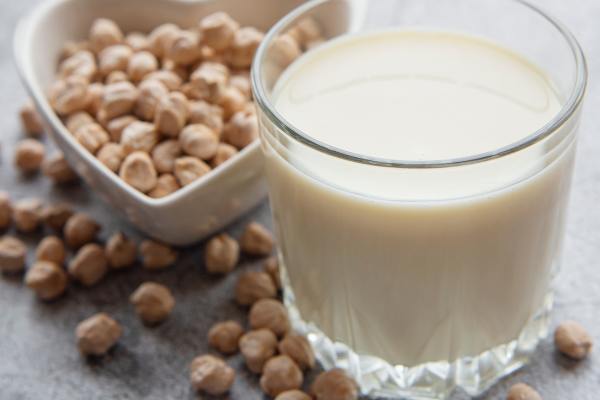
Origin:
Pea milk, or pea protein beverage, is a plant-based milk produced using pea protein extracted from yellow peas, usually in combination with water, sunflower oil, micronutrients added for food fortification, thickeners, and phosphates. Pea milk offers 8 grams of protein per serving, which is about the same amount as dairy milk. The high protein content has several health benefits, including increased muscle mass and better blood sugar control. Pea milk production is environmentally sustainable and requires less water than dairy milk production.
Nutritional value and benefits:
S/N | Nutrient content | Nutritional value per 100g/Daily Value (DV) in 1005 of unsweetened pea milk |
1. | Calories | 70 Kcal |
2. | Carbohydrates | 0 g |
3. | Fat | 4.5 g |
4. | Protein | 8 g |
5. | Potassium | 13% |
6. | Calcium | 45% DV |
7. | Iron | 15% DV |
8. | Vitamin A | 10% DV |
9. | Vitamin D | 30% DV |
- High proteins in pea milk increase muscle mass and better blood sugar control.
- Pea milk serves as an alternative to cow milk for lactose-intolerant people.
- Pea milk is low in sugar and carbohydrates. This helps people on low-carb diets or those with diabetes to keep track of their blood sugar levels.
More information:
For more information, kindly visit the following links:
https://www.medicinenet.com/ripple_milk_7_reasons_why_you_should_try_pea_milk/article.htm
https://www.healthline.com/nutrition/ripple-milk#TOC_TITLE_HDR_7
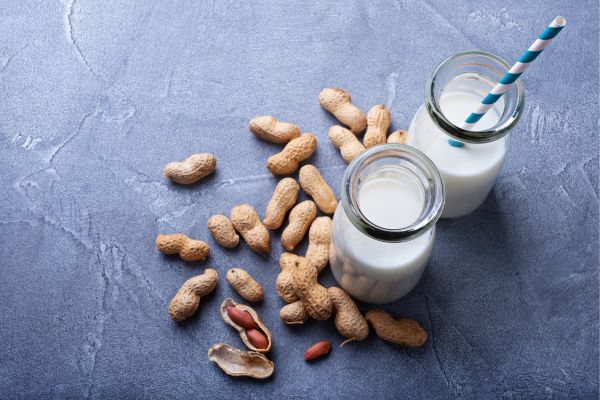
Origin:
Peanut milk is plant milk, which is an alternative to animal milk. It is made with peanuts, water, and sometimes other additional ingredients like salt, sugar, or cinnamon. Peanut milk is high in fat and protein compared to other plant-based milks. The milk is an alternative for people who are lactose intolerant or vegan.
Nutritional value and benefits:
Nutrient content | Nutritional value per 100g of peanut milk |
Calories | 150 Cal |
Fat | 11 g |
Protein | 6 g |
Carbohydrates | 6 g |
- Consuming peanut milk can help strengthen bones and maintain bone health as we age.
- Peanut milk helps to reduce the risk of developing type 2 diabetes and helps the body regulate insulin.
- Peanuts are rich in antioxidants and contain high concentrations of polyphenolic antioxidants, isoflavones, and phytic acid, which helps to reduce the risk of developing cancer and other diseases.
- The presence of unsaturated fats in peanut milk helps to lower cholesterol levels. It also helps to reduce blood clots from forming within the body while preventing and reducing the risk of heart attacks and stroke.
- Peanut milk can help increase cognitive functioning and promote better brain health.
More information:
For more information on how to make homemade peanut milk, kindly click on the following link:

